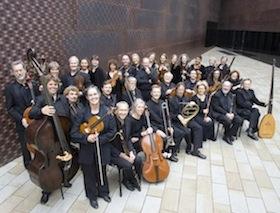A friend of mine once divided “classical music” into three subcategories: “music,” “pre-music,” and “post-music.” The first, naturally, meant music he might be interested in performing; the other two, everything else. It’s one of the blessings of living in the Bay Area that the “pre-” and the “post-” are everywhere to be had; you needn’t go far out of your way to define “music” for yourself. Here are a few concerts to entice anyone interested in the old, the new, or maybe both.
Musica Pacifica: Music in the Time of Vermeer
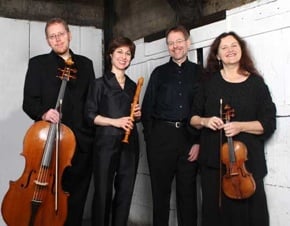
This small, mixed chamber ensemble comprises the cream of the Bay Area’s early-music crop, and ranges zestfully over a couple of centuries’ worth of music. Its first fall concert, at San Francisco’s Palace of the Legion of Honor, is designed to complement the exhibit of 17th-century Dutch and Flemish painting there. The music and the art make a bewildering combination: so much precision with the brush, so much rash freedom with the bow and the breath!
Sept. 11, 12 p.m., Legion of Honor, San Francisco, free with museum admission.
Left Coast Chamber Ensemble: Two Sets of Keys
“Two Sets of Keys” is how the program is titled — aptly, since half of it involves harpsichord, half piano. The harpsichord gets its innings in one of Couperin’s Concerts royaux and in a rarely performed work of Henri Dutilleux, Les Citations, for the alluring combo of oboe, bass, harpsichord, and percussion. The piano surfaces in more Dutilleux — his ingratiating Oboe Sonata — and in Debussy’s early (1880) Piano Trio, the best piece of chamber music Jules Massenet never wrote.
Sept. 29, 8 p.m., Throckmorton Theatre, Mill Valley; Oct. 3, 8 p.m., Green Room, War Memorial Building, San Francisco, $20–$25, (415) 383-9600.
Kronos Quartet, Cal Performances
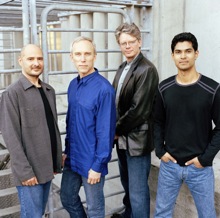
A rare opportunity looms to hear the three big pieces Steve Reich wrote for Kronos, all in one concert. Different Trains is by now a classic of live-music-plus-electronics, a piece about trains in which wonder and horror are mixed. (Here are the trains any child must marvel at; here too are the trains that ran to Auschwitz.) Also on the program are Reich’s Triple Quartet (one Kronos live, two Kronoses prerecorded), and the recent WTC 9/11, Reich’s tribute to the dead of the terrorist attacks 10 years ago.
Oct. 9, 7 p.m., Hertz Hall, UC Berkeley, $50, (510) 642-9988.
Ensemble Caprice: La Follia and the Gypsies, San Francisco Early Music Society
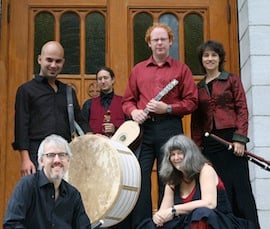
Strange though it may seem, the “classical” music world didn’t just stumble on “popular” music in the late20th century. Everything from bawdy songs to fiddlers’ tunes to dance rhythms has been raw material for composers for pretty well as long as we’ve had written music at all. Ensemble Caprice’s program for the San Francisco Early Music Society focuses on the Gypsies, surveying three centuries’ worth of Gypsy-influenced “classical” music (plus, if I’m not mistaken, some rough samples of the real thing). Since there’s some bizarrely great music to draw on, this ought to be fun.
Oct. 21, 8 p.m., First Lutheran Church, Palo Alto; Oct. 22, 7:30 p.m., St. John’s Presbyterian Church, Berkeley; Oct. 23, 4 p.m., St. Mark’s Lutheran Church, San Francisco, $28–$35, (510) 528-1725.
Sō Percussion, M. C. Schmidt, Cenk Ergun at Stanford Lively Arts
As part of a festival commemorating John Cage’s work with the choreographer Merce Cunningham, the outrageously dexterous quartet known as Sō Percussion teams up with a pair of electronica stars for an evening of late Cage and post-Cageiana. Be prepared to check any preconceptions at the door.
Oct. 26, 8 p.m., Dinkelspiel Auditorium, Stanford University, $44–$50, (650) 725-ARTS (2787).
Philharmonia Baroque Orchestra With Vivica Genaux
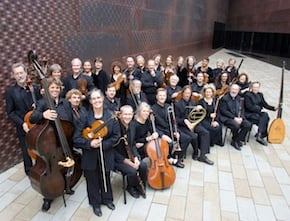
Nearly anything the PBO takes on is worth hearing, but it does happen sometimes that a specially focused program will skirt a particular listener’s taste altogether. There’s little risk of that with the ensemble’s October set. Mezzo-soprano Vivica Genaux is the headliner, singing arias of Vivaldi, Hasse, Porpora, and Broschi (the last being the birth name of the celebrated castrato Farinelli, about the closest thing the 18th century had to a rock star). But in between the arias come instrumental works: a wind concerto with six soloists by Fasch, a string concerto by Telemann, and — most enticing of all — an orchestral suite from Rameau’s 1751 La Guirlande. I don’t know which is more intriguing: the prospect of hearing Rameau orchestral music I’ve never encountered before, or the chance to hear this band and this conductor tackle it.
Oct. 27, 8 p.m., Center for the Performing Arts, Menlo-Atherton; Oct. 28, 8 p.m., Herbst Theatre, San Francisco; Oct. 29, 8 p.m., and Oct. 30, 7:30 p.m., First Congregational Church, Berkeley, $25–$90, (415) 392-4400.
Apollo’s Fire With Philippe Jaroussky, Cal Performances
Should anyone not be tired of Farinelli’s repertoire after the Philharmonia Baroque set, here is Philippe Jaroussky, among the most recent of the countertenor superstars, singing Handel and Vivaldi arias with Jeannette Sorrell’s Cleveland-based ensemble Apollo’s Fire. The program (leavened by a couple of Vivaldi instrumental concertos) is a daunting one, but there’s no trove of 18th-century music richer, nor anyone better equipped to make it truly sing.
Oct. 30, 3 p.m., Zellerbach Hall, UC Berkeley, (510) 642-9988.
New Esterházy Quartet: Haydn and His Students III
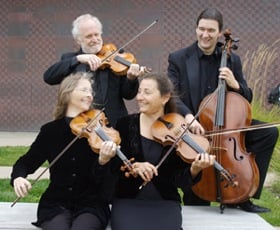
What do you do when you’ve publicly performed every last string quartet Joseph Haydn ever wrote? Find more quartets to play, of course. The New EsterházyQuartet, having run out of Haydn a couple years back, is focusing now on his contemporaries and pupils. November’s set includes a Haydn quartet, a Beethoven quartet (the formidably dark Opus 95), and quartets by Anton Reicha and Nicolas Zmeskall. It’s terra incognita even for me, since I’ve never run across Zmeskall, and, though I know some Reicha, I’ve never heard or played a string quartet of his. But I trust the NEQ’s judgment, and I know from personal experience that the early 19th century is chock-full of terrific and completely unknown chamber music. A grab bag, yet a mighty appealing one.
Nov. 26, 4 p.m., St. Mark’s Lutheran Church, San Francisco; Nov. 27, 4 p.m., All Saints Episcopal Church, Palo Alto, $10–$25, (415) 520-0611.
Brentano Quartet, San Francisco Performances
Anyone who’s followed this quirky (and preposterously skilled) ensemble for any time at all knows that it’s ill-inclined to sit still, and that when it does move, it’s nearly always in a startling direction. The quartet’s most recent project is called Fragments, and the idea is that half a dozen living composers are presented with unfinished works of earlier composers, to respond to as they will. (See the video here, wherein composers Bruce Adolphe, Vijay Iyer, and Charles Wuorinen talk about their contributions to the project.)
You can deal with incomplete pieces in only a few ways — you don’t play them at all (or play only and exactly what’s actually in the manuscript); or you complete them in the best approximation of the composer’s style you can muster; or you take the fragment as a jumping-off point and write something the originating composer would never have dreamt of. The last is the most fruitful, as well as the most fun. (Can’t imagine “Wuorinen” and “fun” in the same concert hall? Go on, I double-dare you.)
Dec. 4, 7 p.m., Herbst Theatre, San Francisco, $38–$60, (415) 398-6449.

